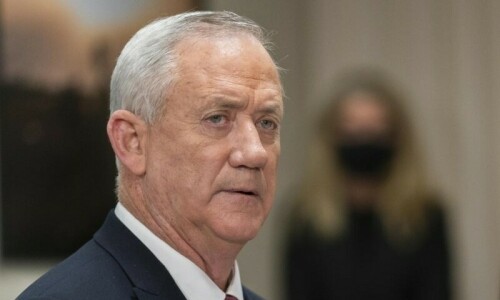KARACHI, Jan 1: Rejecting a detailed caveat entered by the Karachi Building Control Authority, a two-member bench of the Supreme Court suspended here on Thursday the operation of a Sindh High Court order to empower the existing city district government police station to take cognizance of the building rules’ violations.
The bench comprising Justices Moosa K. Leghari and Zawwar Hussain Jaffrey admitted an appeal moved by the provincial government against the SHC division bench order of Sept 25, 2008, through Advocate-General M. Yusuf Leghari for hearing on a date to be fixed by office. Advocate Shahid Jamil Khan appeared for the KBCA.
The AG submitted that the KBCA had no authority to move a writ petition for its empowerment against the provincial government and the high court exceeded its jurisdiction by asking it to confer fully-fledged authority on the CDGK police station. Police stations are created and carry out their functions under the code of criminal procedure, which has no provision for establishment of a police station for enforcement of the Sindh Building Control Ordinance specifically.
In its order in three petitions moved by the KBCA and non-governmental organisations, the SHC held that the city district government police station already set up under a provincial government notification issued in 2007 should be duly empowered to serve the purpose it was created for, that is, the enforcement of the SBCO to curb unauthorised constructions. It said the menace of illegal structures was quite as serious, if not more, as the threat posed by unlawful construction. If a separate police station could be set up for the Karachi Electricity Supply Corporation and a separate police force raised for the railways, the CDGK police station could also be duly empowered.
The high court had directed the home secretary and the provincial police chief to take the necessary measures for empowering the CDGK police station to register first information reports. It also barred the utilities from sanctioning their connections to any building within the KBCA purview without a no-objection certificate from the authority as stipulated by the provisions of the SBCO. Finally, it directed the properties registrar to refuse registration of sub-leases without the KBCA’s approval. The expenses on equipping the police stations with transport and a strong room were to be met by the city district government.
The KBCA counsel contended in the authority’s caveat that the impugned order provided for a comprehensive framework for the SBCO’s enforcement, which the authority was unable to ensure in the absence of magisterial and police powers. He said the KBCA was not seeking creation of a new police station but empowerment of a police station already set up by the respondent provincial government. The government, he argued, had not challenged the notification. Hundreds of cases were pending in the high court wherein it had ordered the demolition of unauthorised buildings, wholly or partially, and directed the KBCA to report compliance. The KBCA, with its meagre staff and resources, was unable to comply because no police assistance was available to it against the owners or builders and illegal occupants.
The KBCA counsel said it was not for the authority alone to ensure compliance with the SBCO and the building rules. The law and rules should be observed by the public utilities also but the KESC, the Sui Southern Gas, the Karachi Water and Sewerage Board, and the PTCL freely sanction their connections to buildings without verifying their legal status. The registration authorities also readily register sub-leases without ascertaining whether the premises had been raised in accordance with the law and rules and, accordingly, cleared by the KBCA. Once the utilities and facilities are available and buildings are occupied, the authority could not but be a silent spectator to the violations, particularly in the absence of police and magisterial powers, the counsel said.
Zakat administrators
The SC bench also admitted a provincial government petition against an SHC order declaring that the provincial zakat council or department had no say in the appointment, removal or suspension of zakat administrators at the district level and the entire authority was vested in the central zakat council.
AG Yusuf Leghari argued that the high court erred in making the declaration because it was not properly assisted. The Zakat and Ushr Ordinance had since been amended to empower the provincial council to notify, remove and suspend the district chairmen. Admitting the petition, the bench suspended the operation of the impugned judgment.











































Dear visitor, the comments section is undergoing an overhaul and will return soon.